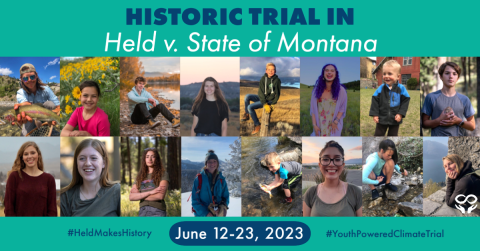
Environmentalists await a verdict from the first climate lawsuit of children versus their government to go to trial.
The following article was published in the July-August 2023 issue of NewsNotes.
Sixteen Montana youths brought a groundbreaking constitutional climate lawsuit, Held v. State of Montana, against their state to protect their rights to a healthy environment, life, dignity, and freedom. They are suing over the state government’s continued support and promotion of fossil fuel extraction and burning, which worsens the climate crisis.
Montana and neighboring Wyoming are home to the Powder River Basin, the largest coal deposit in the United States, and is responsible for more than 40% of coal production in the country.
The plaintiff’s attorney, Nate Bellinger, urged Judge Kathy Seeley to strike down as unconstitutional a Montana law that prohibits state agencies from considering environmental effects when it weighs permits enabling the release of greenhouse gases. Their case hinges on the Montana Constitution, which guarantees the state’s citizens the right to a clean and healthful environment.
The state has tried several times to have the case dismissed since it was first filed in 2020. The trial was allowed to go forward, however, and concluded seven days later, on June 19. Attorneys expect Judge Kathy Seeley to render a decision within 60 days.
This is the first youth-led climate case to make it to trial in the United States. The Montana case is part of a larger movement where young people are suing governments for failing to act on climate change.
Our Children’s Trust, the advocacy group that organized the suit on behalf of the plaintiffs, has similar cases pending on behalf of children in other states, as well as the Juliana v. United States federal-level case, and a dozen similar cases overseas. A positive ruling by Judge Seeley could serve as a powerful legal precedent.
The lead plaintiff, Rikki Held, 22, testified to her family’s ranch in eastern Montana being threatened by extreme weather, such as droughts, heat waves, wildfires, and floods. Plaintiffs Mika K. and Olivia V. testified to Montana’s increasingly frequent wildfires that have exacerbated their asthma. “It feels like it’s suffocating me, like, if I’m outside for minutes,” Olivia said.
Pediatrician Dr. Lori Byron shared expert testimony about extreme temperatures, and the smoke of wildfires, causing permanent damage to the developing lungs and brains of children, in addition to the emotional trauma caused by such climate disasters.
Steve Running, co-winner of the 2007 Nobel Peace Prize for his work with the Intergovernmental Panel on Climate Change shared: “this is when our growing-season droughts get worse, and the final thing is when wildfires get more wild than we’ve ever seen.”
“We are at a decision point about taking action on climate change,” testified plaintiffs’ witness Peter Erickson, a climate change policy researcher at the Stockholm Environment Institute in Seattle, Washington, “The world community has decided that we must.”
The defense took only one day to testify. Montana assistant attorney general Michael Russell conceded that fossil fuels emit greenhouse gases, though he argued Montana cannot by itself have an effect on climate change since Montana’s emissions are too minuscule to make any difference. “Climate change is a global issue that effectively relegates Montana’s role to that of a spectator.”
Attorney Bellinger responded, saying, “The defendants argue that Montana’s greenhouse gas emissions don’t matter, but irrefutable expert testimony affirms that Montana’s emissions are substantial,” he added. “Montana’s contribution to anthropogenic climate change harms plaintiffs. The impacts of Montana’s emissions are both local and immediate as well as global and long lasting.”
Coal, such as that which is mined from the Powder Basin, is the most carbon intensive fossil fuel we can burn. Although that coal may not all be burned in Montana, it has its origins there. “The climate crisis that we are experiencing is being substantially contributed to by Montana,” says Olson. If the plaintiffs win the current suit, the Montana DEQ would have to scrutinize future permitting at the basin, perhaps limiting the amount of extraction that takes place there.
The effects of a warming planet are already visible throughout Montana, as seen in the shrinking glaciers at Glacier National Park and a lengthening wildfire season, which pose threats to the state’s outdoor pastime economy.
Environmental advocates believe a favorable outcome from the lawsuit could pressure government leaders in Montana and elsewhere to curb emissions. They are also hopeful that the judge could order the state to consider climate impacts when approving new projects.
Julia Olson, the executive director of Our Children’s Trust, the environmental nonprofit that helped bring the Montana lawsuit, said the case has the potential to set a new course for a healthier and more prosperous future for the generations to come.
Faith in action
Follow updates on the lawsuit at https://mogc.info/HvM
